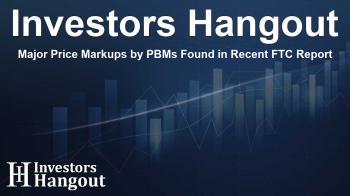Major Price Markups by PBMs Found in Recent FTC Report

Insight into PBMs' Price Markups on Specialty Drugs
The recent release of a report by the Federal Trade Commission (FTC) underscores a troubling pattern among major pharmacy benefit managers (PBMs) engaging in significant markups on specialty generic drugs. The investigation highlighted practices from the three largest players in the field: Caremark Rx, LLC, Express Scripts, Inc., and OptumRx, Inc., each affiliated with powerful healthcare conglomerates. For instance, Caremark is a subsidiary of CVS, Express Scripts is under Cigna, and OptumRx operates as a division of United Health.
Exorbitant Price Increases Revealed
According to the FTC's findings, the markup rates on a range of specialty generic drugs have skyrocketed, showing increases from hundreds to thousands of percent. This alarming trend can be observed from 2017 to 2022, during which these three PBMs and their corresponding specialty pharmacies amassed an impressive total of over $7.3 billion in revenue from drug dispensing alone. Such earnings far outstrip the estimated cost for acquiring these drugs, raising important questions about healthcare spending practices.
Analysis of Drug Pricing Practices
Within the framework of the FTC's investigation, the analysis scrutinized 51 different specialty generic drugs, encompassing a total of 882 National Drug Codes. The researchers identified that affiliated pharmacies associated with the PBMs were reimbursed at rates significantly higher than those received by non-affiliated pharmacies. Furthermore, a tendency was noted where profitable prescriptions were preferentially channeled toward these affiliated pharmacies.
Impact of Specialized Drug Markups
One shocking revelation from the report was that many commercial prescriptions for specialty generic drugs, with markups exceeding $1,000 each, were predominantly filled by the three PBMs' affiliated pharmacies. The top ten specialty generic drugs alone accounted for an astonishing $6.2 billion in revenue over average drug acquisition costs, making up 85 percent of the total excess earnings during the study period.
Financial Gains from Spread Pricing
Additionally, the report estimated that the three PBMs netted around $1.4 billion through a practice known as spread pricing. This strategy involves charging their plan sponsor clients more than what pharmacies are reimbursed, leading to substantial profit margins. The fiscal benefits derived from dispensing specialty generic drugs have emerged as critical contributors to the operational earnings of their parent companies, which extend across PBM and pharmacy services.
Continuing Trends in Drug Payment Increases
Despite these eye-opening findings, it is disheartening to note that the financial burdens on patients, employers, and healthcare sponsors continue to escalate year after year. For instance, in one recent year, plan sponsors were reported to have spent approximately $4.8 billion on specialty generic drugs, while patient cost-sharing reached $297 million.
Call for Action from the FTC
FTC Chair Lina M. Khan has made it clear that the Commission is committed to utilizing its resources to investigate and curb practices that drive up drug costs, potentially obstructing access to affordable healthcare options. With the growing concern surrounding escalating drug costs, FTC staff have urged policymakers to take action against this critical issue.
Ongoing Investigation into the PBM Industry
This comprehensive report is part of the Commission's larger investigative efforts aimed at understanding the dynamics within the PBM sector. The FTC has pledged to keep the public informed with timely updates as they continue to delve deeper into this complex and pressing topic.
Frequently Asked Questions
What is a Pharmacy Benefit Manager (PBM)?
A Pharmacy Benefit Manager (PBM) is a third-party administrator of prescription drug programs that facilitate the relationship between insurers, pharmacies, and drug manufacturers.
Why is the FTC investigating PBMs?
The FTC is investigating PBMs to uncover practices that inflate drug prices, thereby impacting the cost patients must bear for medication.
What significant findings did the FTC report reveal?
The report revealed that the major PBMs marked up specialty drug prices significantly and generated substantial revenues, highlighting a problematic pricing structure.
How do price markups affect patients?
Price markups lead to higher costs for patients, insurers, and other healthcare payers, which can worsen accessibility to essential medications.
What actions can be expected from the FTC moving forward?
The FTC is expected to continue its investigations into the PBM industry, working toward regulations that could mitigate excessive pricing practices.
About Investors Hangout
Investors Hangout is a leading online stock forum for financial discussion and learning, offering a wide range of free tools and resources. It draws in traders of all levels, who exchange market knowledge, investigate trading tactics, and keep an eye on industry developments in real time. Featuring financial articles, stock message boards, quotes, charts, company profiles, and live news updates. Through cooperative learning and a wealth of informational resources, it helps users from novices creating their first portfolios to experts honing their techniques. Join Investors Hangout today: https://investorshangout.com/
Disclaimer: The content of this article is solely for general informational purposes only; it does not represent legal, financial, or investment advice. Investors Hangout does not offer financial advice; the author is not a licensed financial advisor. Consult a qualified advisor before making any financial or investment decisions based on this article. The author's interpretation of publicly available data shapes the opinions presented here; as a result, they should not be taken as advice to purchase, sell, or hold any securities mentioned or any other investments. The author does not guarantee the accuracy, completeness, or timeliness of any material, providing it "as is." Information and market conditions may change; past performance is not indicative of future outcomes. If any of the material offered here is inaccurate, please contact us for corrections.
